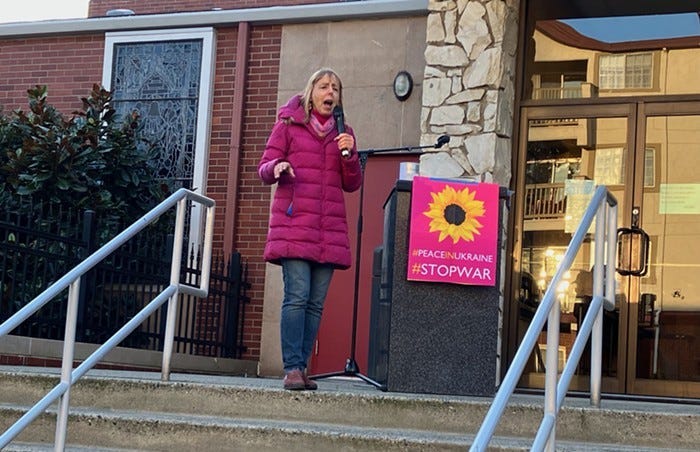Seattle Bookstore and Church Cancels Peace Talk about War in Ukraine
Mary Cogan Paterson
Two recent cancellations of a book talk by anti-war activist Medea Benjamin raise questions about free speech in a time of war.
At first, the University Book Store seemed enthusiastic about hosting an event with the Seattle Anti-War Coalition (SAWC) that featured a reading of War in Ukraine: Making Sense of a Senseless Conflict, by CodePink co-founder Medea Benjamin and Nicolas J.S. Davies.
The book condemns Russia’s invasion as criminal, but it also examines the history of U.S. interference during Ukraine’s political turmoil in 2014 and the pressure placed on Russia by NATO’s expansion into eastern Europe over the last 30 years.
The book is not by any stretch an apology for Putin, but people committed to a fight to the finish in Ukraine would not likely welcome the introduction of historical nuances like these because they disturb the mainstream narrative of the U.S. and NATO as good guys simply coming to the aid of a country under attack.
Indeed, at the end of February, weeks before the scheduled reading date of March 14, the bookstore told SAWC organizers that the store had received some pushback about the event from a group of people outside of the university community, from some faculty at the University of Washington, and from a student group on campus.
SAWC assured the bookstore that it had no intention of causing further trauma to Ukrainians in the Seattle community, and that it sought dialogue, which author Medea Benjamin always makes space for at her talks.
The bookstore then indicated further misgivings. They said its event staff was not trained in dealing with controversy, and they added that only one person had RSVP’d, so it did not make business sense for them to hold the event. SAWC organizers asked for time to mobilize people to RSVP, but the bookstore had already made up its mind. With six days to go before the event, they canceled, encouraging organizers to find another venue.
A new venue was quickly found at the University Congregational Church, just two blocks from the bookstore. But on the afternoon of March 14-four hours before the event was to take place-organizers received a phone call from the church, announcing their decision to cancel.
The pastor made no mention of complaints from the congregation, although this is what the church maintained later. Instead, he stated on the phone that the church had been in conversation with the university and with the bookstore, that the church’s relationships with the university and the U District were very important, and that they had therefore decided to “follow the lead” of the bookstore in canceling.
On March 14, with no room at the inn, Seattle Anti-War Coalition held a rally outside the bookstore at 5 pm and marched to the church at 6 pm, where Benjamin gave a short version of her book talk on the front steps, facing about 50 listeners on the sidewalk. In six months of touring with her book, this was the first time Benjamin had an event canceled.
The cancellations took organizers by surprise. None of us question the right of people to defend themselves when under attack. Given that the U.S. is supporting Ukraine by supplying weapons, intelligence, and training, however, it is our responsibility as citizens to question the true purpose of a protracted war, now over one year old.
No matter what “side” you are on in the question of Russia, Ukraine, and the role of the U.S. and NATO in the ongoing war, you are likely aware of how many people in your network, let alone the media, dismiss the possibility of negotiations for a ceasefire and a settlement.
Seattle Congresswoman Jayapal learned how quickly any mention of “negotiations” gets shut down when the Congressional Progressive Caucus submitted and then quickly withdrew a letter to President Biden calling for negotiations alongside continued defense of Ukraine.
Organizations on the left critique “negotiations” as the tool of imperialist governments like Russia and the U.S. to extend their dominance. Progressives and liberals who in principle oppose war assert that this war is “different,” that it is impossible to negotiate with a madman like Putin, and that it’s pointless to seek negotiations. Every time a government attempts to facilitate peace talks-Turkey in the spring of 2022 and, most recently, China-U.S. leaders disparage the prospect.
The Seattle Anti-War Coalition asks, if we cannot hold events in bookstores and churches, then where can people with differing views meet to talk about war and peace? We reject the false binary of, “Either you’re with us on a fight to the finish in Ukraine, or you’re with Putin and the Russian oligarchs.” We deplore the Russian invasion, and we deplore U.S. militarism-not only in Ukraine but in Yemen and Syria and in the 80 countries globally where the U.S. military has its 750 bases. We assert the great need for spaces where people can talk about how to shift from making war to making peace.
Mary Cogan Paterson represents 350 Seattle on the Seattle Antiwar Coalition, focusing on the intersection of war, climate, and systems of dominance and oppression. The Seattle Antiwar Coalition was founded during the vigil and protests that were held in downtown Seattle during the US war in Iraq war. It continues to protest against US militarism and endless wars.
Originally published at https://www.thestranger.com
.



